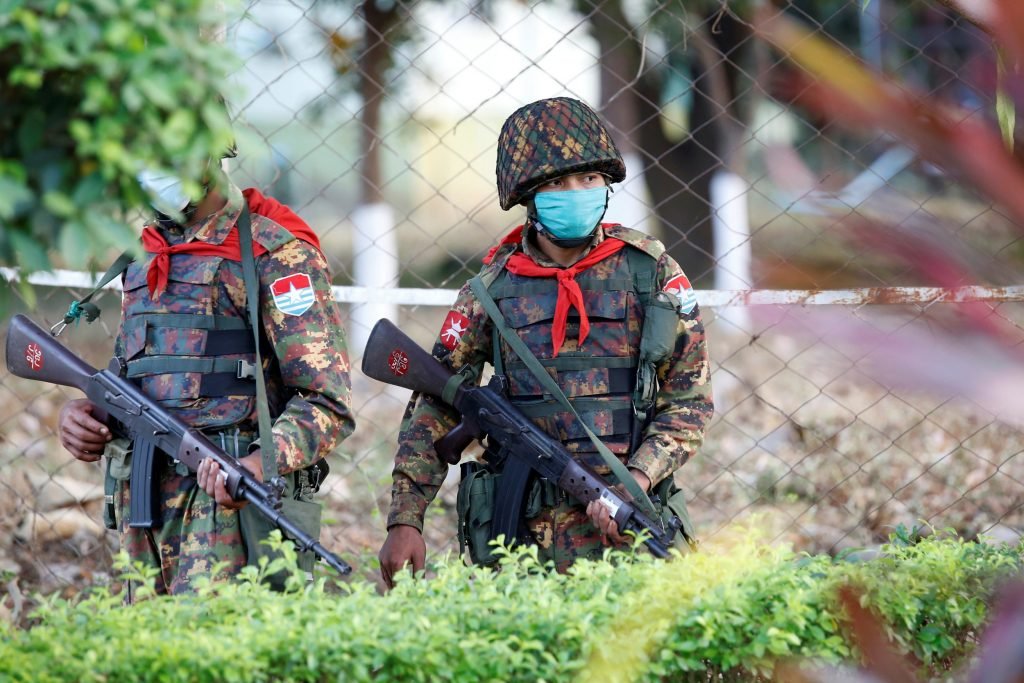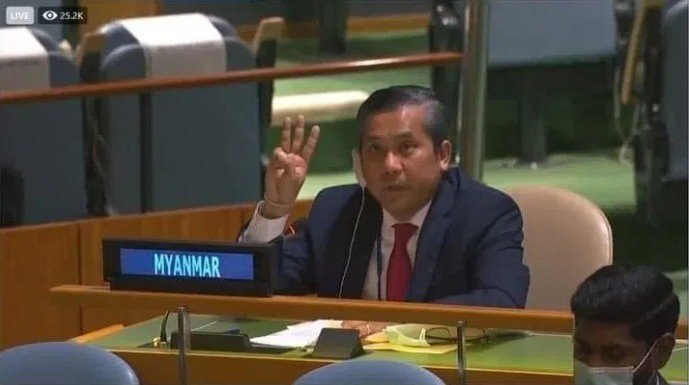India’s reaction to the Tatmadaw: An analysis

Since 1st February 2021, Myanmar has been under a state of emergency which is supposed to be so for one year. This came after the military junta “Tatmadaw” carried a coup d’état, ever since the results were announced indicating the landslide victory of Ms Aung Suu Kyi’s National League of Democracy (NLD) party in the general election and while the Army-backed Union Solidarity and Development Party (USDP) suffered a humiliating defeat. The USDP did not accept the results and alleged fraud in the elections, without offering any evidence. In the process, the military has detained State Counsellor Suu Kyi, President Win Myint and other top leaders of the NLD. The country’s ousted civilian leader has faced charges of corruption and sedition, in a secret court.
Protests and detentions
Thereupon, streets have been taken up by demonstrations led by students, activists, monks and civilians to protest against the military rule. Military leaders’ initially restrained response to the first waves of protests, civil disobedience and general strikes has grown more forceful over time, escalating into a brutal effort to put down the movement that has so far left thousands injured and more than 600 dead. Many of those who have been killed, arrested and tortured are young protesters.
Responses
There has been a mixed international response to the current situation in Naypyidaw. While the United States and European Union have condemned the actions of the army and reimposed sanctions against them, China and Russia have diverted from the stand that the west has taken as they refrained from being critical to Myanmar’s present ruling class and have stated this as their internal matter.

Myanmar- India
Burma is a bordering country to India, which is of strategic significance as it is New Delhi’s gateway to South East Asia. Therefore, its response to the ongoing situation in its neighbour is of key importance.
India’s Reaction to the military crackdown
India’s External Affairs Minister S. Jaishankar in his statement said, “ India has always been steadfast in its support to the process of democratic transition in Myanmar. We believe that the rule of law and the democratic process must be upheld.” Further, he expressed “deep concern” over the reports of an unfolding military coup in Myanmar. However, there hasn’t come any strong condemnation by the world’s largest democracy against the junta as the US and EU have done. India was among the eight nations to attend Tatmadaw Day in Myanmar. The development came nearly two months after Myanmar’s military took control of power, removing government ministers and imprisoning Aung San Suu Kyi, the de-facto head of the state, and country’s President Win Myint. Apart from that, India has also one of the main vaccine suppliers to Naypyidaw.
With the worsening democratic situation in Myanmar, India beefed up its border security by sealing the border and pushing back the fleeing dissidents into the North-Eastern states. This came after there were reports of the inflow of Chin refugees to these states.
Now, this has been looked upon by many experts in India, as New Delhi’s silence and reluctance to act and criticise its neighbour in competition with China a key player in the region which supports the military rule as being pro- Beijing.

New Delhi at UN
Moreover, the kind of stand that India has taken in the United Nations cannot be overlooked. In March this year, in a closed-door consultation on the situation in Myanmar at United Nations Security Council (UNSC) meeting, Indian Envoy to the UN TS Tirumurti urged the country to apply maximum restraint; called for the release of detained leaders and expressed India’s commitment to democratic transition. He further said that the situation in Myanmar should be resolved peacefully and that the matter needs greater engagement, and welcomed the ASEAN efforts in the region.
United Kingdom in the UNSC drafted a statement warning the Myanmar Army of “further measures” by the council and nudging it to exercise restraint, apart from releasing the deposed State Counsellor Aung San Suu Kyi and other leaders and activists of her party, National League for Democracy (NLD). However, this couldn’t get consensus from the Security Council members such as India, Vietnam, China and Russia who have sought amendments to the draft. The current scenario when New Delhi seems to have joined hands with countries like China, Russia and Vietnam, which themselves don’t have a great democratic record as most of them are a one-party ruled, leaves some clue of India’s present diplomatic position.
Abstentions at the General Assembly
Another news that has created some buzz internationally and at home is the recent development at the United Nations General Assembly(UNGA), which is India’s abstention along with 36 other nations at the UN from voting on Myanmar Resolution. The reason given for this step by India at the UN is the fact that the resolution doesn’t reflect its views and a “consultative and constructive” approach involving Myanmar’s neighbouring countries is important as the international community strives for the peaceful resolution of the issue.
“We, therefore, do not believe that the tabling of this resolution for adoption at this juncture, is conducive to aiding our joint efforts towards strengthening the democratic process in Myanmar. We are therefore constrained to abstain,” this statement by New Delhi’s envoy Trimurti reasoned New Delhi’s stance on Myanma.
The resolution called “ upon the Myanmar armed forces to respect the people’s will as freely expressed by results of the general election of November 8, 2020, to end the state of emergency, to respect all human rights of people of Myanmar and to allow the sustained democratic transition of Myanmar, including the opening of the democratically elected parliament, and by working towards bringing all national institutions, including the armed forces, under a fully inclusive civilian government that is representative of the people’s will”.

The ASEAN bet
India called itself Myanmar’s immediate neighbour and close friend of its people, it is cognizant of the “serious impact of political instability” and the potential of its spillover beyond Myanmar’s borders; said Ambassador Triumurti as he further backed the ASEAN five points initiative on Myanmar.
Now, what is interesting is the fact that four of the ten ASEAN nations—Cambodia, Brunei Darussalam, Laos and Thailand have abstained from voting at UNGA and China one of the key players in the region and an important external ally of ASEAN has voted against the resolution. Apart from this, most of these South-East Asian neighbours aren’t even democracies, as Thailand has seen strong pro-democratic protests against the orthodox monarchy while Laos is a one-party system. All these nations have a humiliating human rights track record. The Association of Southeast Asian Nations five-point consensus on Myanmar started with a call for the immediate cessation of violence, although calls for the release of political detainees were not explicitly included. Second, a reconciliation process through constructive dialogue should take place, through, thirdly, the mediation of a special envoy of the ASEAN chair with the assistance of the ASEAN secretary-general.
The fourth and fifth point ask for the safe passage of humanitarian aid and the visit by the special envoy to the country
India’s shift in attitude towards Tatmadaw
India’s stand on Tatmadaw has shown a shift from what it was in 1988 when it aligned itself with the pro-democratic camp and viewed military rule in Naypyidaw as a threat to democracy. Later, opened its doors for activists to take political asylum, while in 1992 it signed a resolution at the United Nations condemning human rights violations. This speaks volume of change in New Delhi’s posture towards Tatmadaw, especially as we compare how it reacted in 1992 to now, be it in terms of opening of borders, resolution at the UN or in the official statements.


















